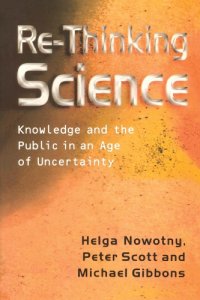
Ebook: Re-Thinking Science: Knowledge and the Public in an Age of Uncertainty
- Tags: History & Philosophy, Science & Math, Social Sciences, Children’s Studies, Communication & Media Studies, Criminology, Customs & Traditions, Demography, Disaster Relief, Emigration & Immigration, Folklore & Mythology, Gender Studies, Gerontology, Holidays, Human Geography, Human Sexuality, Library & Information Science, Linguistics, Methodology, Museum Studies & Museology, Philanthropy & Charity, Popular Culture, Pornography, Poverty, Privacy & Surveillance, Reference, Research, Social Work, Specific Demographics, Urban P
- Year: 2001
- Publisher: Polity
- Edition: 1
- Language: English
- pdf
Re-Thinking Science presents an account of the dynamic relationship between society and science. Despite the mounting evidence of a much closer, interactive relationship between society and science, current debate still seems to turn on the need to maintain a 'line' to demarcate them. The view persists that there is a one-way communication flow from science to society - with scant attention given to the ways in which society communicates with science.
The authors argue that changes in society now make such communications both more likely and more numerous, and that this is transforming science not only in its research practices and the institutions that support it but also deep in its epistemological core. To explain these changes, Nowotny, Scott and Gibbons have developed an open, dynamic framework for re-thinking science.
The authors conclude that the line which formerly demarcated society from science is regularly transgressed and that the resulting closer interaction of science and society signals the emergence of a new kind of science: contextualized or context-sensitive science. The co-evolution between society and science requires a more or less complete re-thinking of the basis on which a new social contract between science and society might be constructed. In their discussion the authors present some of the elements that would comprise this new social contract.
The authors argue that changes in society now make such communications both more likely and more numerous, and that this is transforming science not only in its research practices and the institutions that support it but also deep in its epistemological core. To explain these changes, Nowotny, Scott and Gibbons have developed an open, dynamic framework for re-thinking science.
The authors conclude that the line which formerly demarcated society from science is regularly transgressed and that the resulting closer interaction of science and society signals the emergence of a new kind of science: contextualized or context-sensitive science. The co-evolution between society and science requires a more or less complete re-thinking of the basis on which a new social contract between science and society might be constructed. In their discussion the authors present some of the elements that would comprise this new social contract.
Download the book Re-Thinking Science: Knowledge and the Public in an Age of Uncertainty for free or read online
Continue reading on any device:

Last viewed books
Related books
{related-news}
Comments (0)